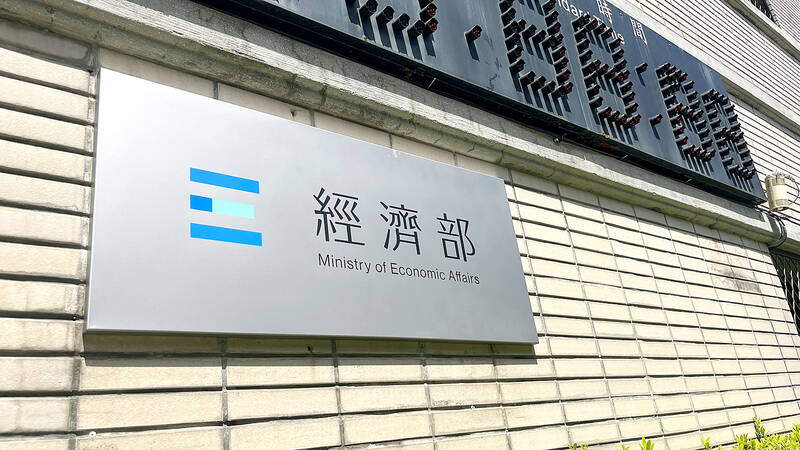The ratio of orders fulfilled by Taiwanese manufacturers overseas has consistently declined over the past several years after US President Donald Trump initiated a trade dispute with China during his first term and the release of ChatGPT sparked an artificial intelligence (AI) boom, causing many companies to shift operations back home, the latest export order statistics showed.
Export orders include orders received by local manufacturers’ local headquarters and overseas operations. Last month, 48.2 percent of all orders received by Taiwanese firms were produced in overseas factories, down 0.3 percentage points year-on-year and hitting the lowest level for the same month since 2009, the Ministry of Economic Affairs said in a report on Tuesday.
The ministry attributed the decline mainly to information and communications technology (ICT) companies increasing domestic production of servers.

Photo: Liao Chia-ning, Taipei Times
For the whole of last year, 48.6 percent of all orders received by local firms were produced overseas, the lowest level since 2010, it said.
The ratio has continued to decline from 2016, when it was 54.6 percent, indicating that local companies are relocating production from China and other regions due to tariffs, geopolitical tensions, and other cost and infrastructure considerations.
The ICT industry and the mechanical engineering sector led others by reporting that 81 percent and 70.3 percent of their export orders respectively were fulfilled by their overseas production bases last year, the data showed.
However, the figure for the ICT industry fell for the sixth consecutive year, while the figure for mechanical engineering also declined from a peak of 75.2 percent in 2019, the data showed.
The data also showed a general downward trend for other industries — such as electronic products, base metals, plastic and rubber products, chemicals, optical devices and machinery equipment.
However, close observation is warranted on the impact on firms’ overseas deployments from Trump’s pledge to bring manufacturing back to the US, as the details of his tariff policy remain unclear, the ministry said.

In Italy’s storied gold-making hubs, jewelers are reworking their designs to trim gold content as they race to blunt the effect of record prices and appeal to shoppers watching their budgets. Gold prices hit a record high on Thursday, surging near US$5,600 an ounce, more than double a year ago as geopolitical concerns and jitters over trade pushed investors toward the safe-haven asset. The rally is putting undue pressure on small artisans as they face mounting demands from customers, including international brands, to produce cheaper items, from signature pieces to wedding rings, according to interviews with four independent jewelers in Italy’s main

Japanese Prime Minister Sanae Takaichi has talked up the benefits of a weaker yen in a campaign speech, adopting a tone at odds with her finance ministry, which has refused to rule out any options to counter excessive foreign exchange volatility. Takaichi later softened her stance, saying she did not have a preference for the yen’s direction. “People say the weak yen is bad right now, but for export industries, it’s a major opportunity,” Takaichi said on Saturday at a rally for Liberal Democratic Party candidate Daishiro Yamagiwa in Kanagawa Prefecture ahead of a snap election on Sunday. “Whether it’s selling food or

CONCERNS: Tech companies investing in AI businesses that purchase their products have raised questions among investors that they are artificially propping up demand Nvidia Corp chief executive officer Jensen Huang (黃仁勳) on Saturday said that the company would be participating in OpenAI’s latest funding round, describing it as potentially “the largest investment we’ve ever made.” “We will invest a great deal of money,” Huang told reporters while visiting Taipei. “I believe in OpenAI. The work that they do is incredible. They’re one of the most consequential companies of our time.” Huang did not say exactly how much Nvidia might contribute, but described the investment as “huge.” “Let Sam announce how much he’s going to raise — it’s for him to decide,” Huang said, referring to OpenAI

The global server market is expected to grow 12.8 percent annually this year, with artificial intelligence (AI) servers projected to account for 16.5 percent, driven by continued investment in AI infrastructure by major cloud service providers (CSPs), market researcher TrendForce Corp (集邦科技) said yesterday. Global AI server shipments this year are expected to increase 28 percent year-on-year to more than 2.7 million units, driven by sustained demand from CSPs and government sovereign cloud projects, TrendForce analyst Frank Kung (龔明德) told the Taipei Times. Demand for GPU-based AI servers, including Nvidia Corp’s GB and Vera Rubin rack systems, is expected to remain high,